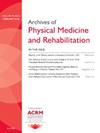“Slipping Away”: A Qualitative Study of Gender in Lived Experiences of Community Integration After Traumatic Brain Injury 1140
IF 3.6
2区 医学
Q1 REHABILITATION
Archives of physical medicine and rehabilitation
Pub Date : 2025-04-01
DOI:10.1016/j.apmr.2025.01.016
引用次数: 0
Abstract
Objectives
To investigate community integration challenges after traumatic brain injury (TBI) through a gender lens.
Design
A reflexive thematic analysis of semistructured interview data with men and women with a primary diagnosis of mild or moderate-severe TBI, in the acute or chronic stages after injury. The data were coded and analyzed according to Braun and Clarke's thematic analysis.
Setting
The largest rehabilitation research-teaching hospital in North America.
Participants
Adult participants (22 men and 20 women) undergoing rehabilitation after TBI.
Interventions
Not applicable.
Main Outcome Measures
Expression of gender in community reintegration after TBI.
Results
Three overarching themes emerged: (1) lack of a “graduated home plan”: difficulty enacting gendered roles and responsibilities at home, (2) “Something that I can't handle”: mismatch between occupational demands and abilities, and (3) “Slipping away”: disrupted connections with self and others. The transformative nature of gender was particularly evident in the home domain of community reintegration, with inabilities to fulfill household tasks traditionally assigned to men and women on the basis of their sex. In the productivity domain, more women reported an inability to meet work demands and more men indicated a limited ability to do so. Both genders encountered disruptions in recreational and leisure activities, but women tended to emphasize obstacles related to social engagement, whereas men leaned toward withdrawal due to anticipated stigma or shame. Across all themes, a pervasive sense of diminished community contributions was observed.
Conclusions
The results emphasize the importance of raising awareness among researchers and practitioners on gender as a transformative process in community reintegration after brain injury. The challenges with community reintegration and critical needs based on gender call for rehabilitation approaches that consider changes in socially created roles, responsibilities, and relationships after TBI.
This research was supported by the Canadian Institutes of Health Research (CIHR) Institute of Gender and Health (#CGW-126580) and in part Canada Research Chairs Programs (CRC-2021-00074, CRC-2019-00019) and the Global Brain Health Institute (GBHI), Alzheimer's Association, and the Alzheimer's Society UK Pilot Award for Global Brain Health Leaders (GBHI ALZ UK-23-971123). The funders had no role in study design, data collection and analysis, decision to publish, or preparation of the manuscript.
Disclosures
none.
求助全文
约1分钟内获得全文
求助全文
来源期刊
CiteScore
6.20
自引率
4.70%
发文量
495
审稿时长
38 days
期刊介绍:
The Archives of Physical Medicine and Rehabilitation publishes original, peer-reviewed research and clinical reports on important trends and developments in physical medicine and rehabilitation and related fields. This international journal brings researchers and clinicians authoritative information on the therapeutic utilization of physical, behavioral and pharmaceutical agents in providing comprehensive care for individuals with chronic illness and disabilities.
Archives began publication in 1920, publishes monthly, and is the official journal of the American Congress of Rehabilitation Medicine. Its papers are cited more often than any other rehabilitation journal.

 求助内容:
求助内容: 应助结果提醒方式:
应助结果提醒方式:


